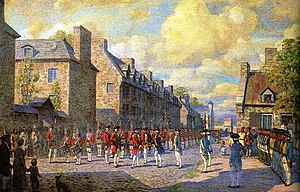| Montreal campaign | |||||||
|---|---|---|---|---|---|---|---|
| Part of the French and Indian War | |||||||
 Surrender of the French Army in Montreal in 1760 | |||||||
| |||||||
| Belligerents | |||||||
| Commanders and leaders | |||||||
|
|
| ||||||
| Strength | |||||||
|
11,000 regulars, 6,500 provincials, 700 Iroquois[1] |
3,200 regulars and Marines,[2] Unknown militia, unknown natives[Note A] | ||||||
| Casualties and losses | |||||||
| Light |
2,200 surrendered,[3] 1,000 sick or missing.[4] Militia and natives pacified[5][6] | ||||||
The Montreal campaign, also known as the fall of Montreal, was a British three-pronged offensive against Montreal which took place from July 2 to 8 September 1760 during the French and Indian War as part of the global Seven Years' War. The campaign, pitted against an outnumbered and outsupplied French army, led to the capitulation and occupation of Montreal, the largest remaining city in French Canada.
Under the overall direction of Jeffery Amherst, British forces numbering around 18,000 men converged on Montreal starting in July from three separate directions. One under Amherst moved in from Lake Ontario, the other under James Murray moved from Québec and the third under William Haviland moved from Fort Crown Point. After capturing French positions and outposts along the way all three forces met up and surrounded Montreal. Many Canadiens deserted or surrendered their arms to British forces while the native allies of the French began to negotiate peace treaties and alliances with the British.
The French military commander in the region, François Gaston de Lévis, was resolved to make a last stand in the city despite the overwhelming numerical inferiority of his troops. He was however overruled by Pierre de Rigaud, the civilian Governor of French Canada who persuaded him to surrender. Lévis attempted to negotiate a surrender with the honours of war, but the British rejected such terms and the French authorities eventually agreed to an unconditional surrender on 8 September. This effectively completed the British capture of New France.[7]
- ^ Anderson 2007, p. 46
- ^ Malartic 2016, pp. 332–33
- ^ "1760 – British three pronged attack against Montreal". Project Seven Years War. Kronoskaf. Retrieved 18 February 2020.
- ^ Atherton, William Henry (1914). Under British rule, 1760–1914 Volume 2 of Montreal, 1535–1914. S. J. Clarke. pp. 3–4.
- ^ Cubbison 2014, p. 84
- ^ Publication of the Oswego Historical Society, Volume 11, Parts 1948–1950. Oswego Historical Society. 1948. p. xxxii. Retrieved 18 February 2020.
- ^ Parkman, Parkman & Levin 1983, p. 1452
